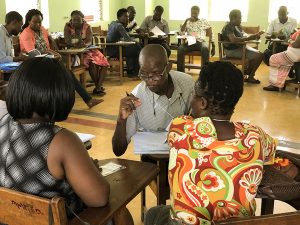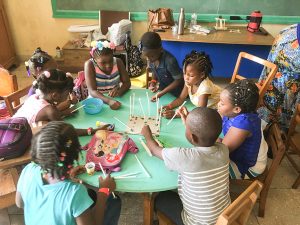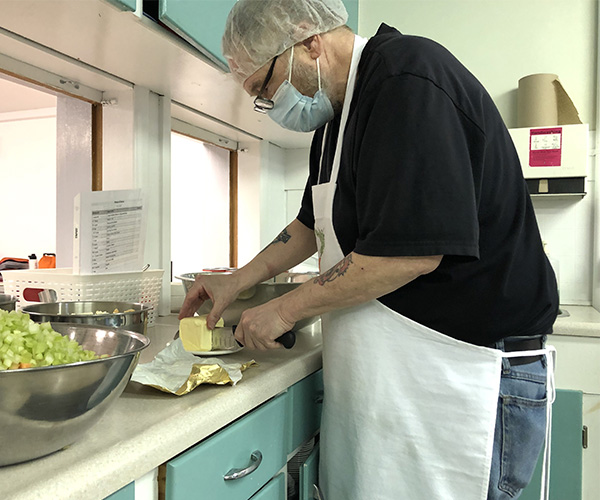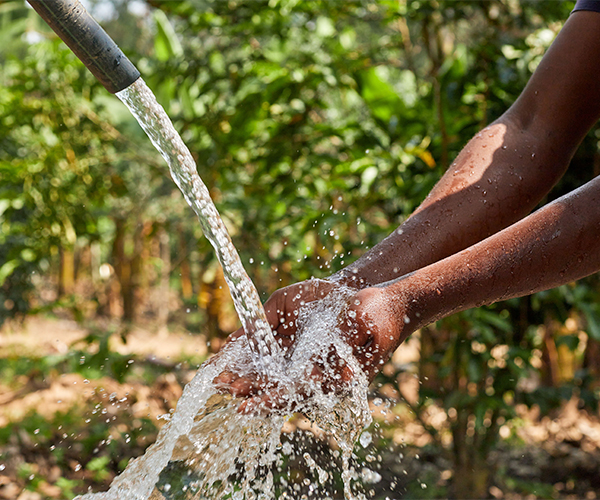Sep 13, 2019
In the spring, the Gay Lea Foundation announced a $25,000 grant to Wilfrid Laurier University’s Educator and Leadership Institute (ELI), a concentrated summer learning institute led by Canadian instructors to provide professional development to Haitian educators.
ELI was created in 2016 by the Wilfrid Laurier University’s Faculty of Education, in partnership with Haitian schools and organizations like Desire2Learn, with a goal to impact student learning outcomes by building teaching and leadership capacity in Haiti. It also provides peer-to-peer run Female STEM program that encourages careers in science, technology, engineering and mathematics (STEM).
The funding received from the Gay Lea Foundation was used for three ELI initiatives: $10,000 to support school leadership training for 25 Haitian lead instructors; $10,000 to support the development and deployment of new online learning resources in Haiti, and; $5,000 to facilitate meetings for female STEM program participants.
The past August, ELI held its fourth summer learning institute. Thirty French-speaking Canadian educators travelled to Cap-Haitien, located on the north coast of Haiti, to train 600 teachers and offer the STEM program to 200 school children.
“In Haiti, only five per cent of teachers have attended an accredited teacher education program,” says Dr. Steve Sider, Associate Professor at Wilfrid Laurier University and head of the ELI. “The summer learning institute provides Haitian teachers training in basic teaching techniques, classroom management and experimental learning techniques that focus on using community resources to engage students.”
Workshop and courses were also offered in six areas determined by our Haitian partners: science, math, early learning, critical literacy, special education and school leadership.
“The school leadership course trains local instructional leaders to be effective adult educators, so they can train future teachers,” says Sider. “This model builds leadership confidence and capacity.”
One of ELI’s practices is sustainable development, says Sider. The Gay Lea Foundation grant helped bring 25 Haitian instructors and four Canadian educators together for a three-day intensive training on adult education in May. These Haitian leaders have participated in ELI over the past three years and have been identified as having significant teaching and leadership expertise. They agreed to participate in the training in preparation for taking on increasingly responsibility in ELI. In 2020, a team of Haitian instructors who have completed this specialized training will lead the ELI will minimal support from Canadian instructors.
“It amazing how the donation from the Gay Lea Foundation can serve as a catalyst for great outcomes,” says Sider.
STEM Program
Another practice for ELI is gender equity and is demonstrated in its STEM program. The initiative pairs Haitian female elementary and high school and university students with Canadian female high school and university students, to encourage careers in science, technology, engineering, and mathematics (STEM). Participants spend a week together in the  summer learning about each other’s culture, engaging in conversations about leadership in STEM-related fields, and sharing resources.
summer learning about each other’s culture, engaging in conversations about leadership in STEM-related fields, and sharing resources.
“The goal of the STEM program is to start a pipeline of women interested in science and math careers as early as 12 years old,” says Sider.
This year, ELI was able to expand STEM program participants from 20 Haitian students to 40, thanks to the support of the Gay Lea Foundation. As well, a STEM camp provided lots of opportunities for more than 200 Haitian children, mostly girls, to engage in science activities. This camp further builds the potential of girls to consider high school and university programs with a focus in STEM.
Online Resource
“ELI participants commit to three years of training,” says Sider. “We identified the need for a resource platform for teachers to access; to bridge the gap between visits,” says Sider.
ELI and Haitian leaders have begun developing an online resource through the Desire2Learn (D2L) platform. D2L has provided its learning platform as part of its investment in ELI.
“Currently, our Haitian participants have limited access to the materials because of the cost of cellular data in Haiti,” says Sider. The resources, all in French, that were developed were uploaded to USB keys and distributed to all participants this past summer, says Sider. In the future, these materials will be available through an online learning platform.
Currently, two Canadian university students are developing resources that will be available for Haitian participants to access online. The online learning platform will provide a central, secure place where both Haitian and Canadian participants can access resources and have moderated discussions related to teaching and learning.
ABOUT WILFRID LAURIER UNIVERSITY
Established in 1911, Wilfrid Laurier University offers undergraduate, graduate and doctoral programs from campuses in Waterloo, Brantford, Kitchener and Toronto, and aspires to inspire lives of leadership and purpose through its academic programming, research and community outreach.

Dec 20, 2023
With the season of giving upon us, the Gay Lea Foundation is pleased to announce 10 new charitable grants supporting healthcare, poverty relief, and community well-being projects.

Sep 5, 2023
The Raw Carrot is a social franchise that believes that every person who WANTS to work should have the opportunity for a hand-up instead of just a handout in life.

Jun 19, 2023
How the Gay Lea Foundation and H2O4ALL are helping communities in Uganda implement sustainable solutions for their water crisis

Jun 14, 2023
The Gay Lea Foundation is pleased to announce 13 new charitable grants supporting education, poverty relief, and/or community well-being projects in Canada, Africa, and South America. The grants were approved by the Foundation board in late April, bringing total donations from the charitable orga